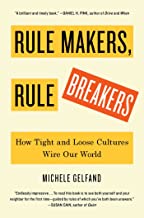Michele Gelfand, Professor of Psychology at the University of Maryland, focuses much of her time on cross-cultural psychology. She is interested in the differences among cultures and norms, and how they develop through time. In this episode, she and EconTalk host Russ Roberts engage in a timely discussion, perfect for our current situation in America: a rift between the two extremes of loose and tight cultures. Careful study done by Gelfand has shown that there exists a good balance between the two, but determining the balance is the challenge. Gelfand views this discussion in the public sphere as vital to keeping the American project going. Professor Gelfand sits down with Roberts to discuss her thoughts and her new book Rule Makers, Rule Breakers.
Questions for further thought and conversation:
1- Gelfand notes that loose cultures are really good at thinking and drafting ideas, but not necessarily at implementing them. To what extent can this idea be compared to Thomas Sowell’s concept of constrained versus unconstrained visions?
2- What types of businesses are more likely to have a tight culture? A loose culture? How does Professor Gelfand measure tightness and looseness?
3- According to Professor Gelfand, how does threat or danger act as a predictor of tightness in culture, and for what reasons?
4- Professor Gelfand argues that the type of culture is often tied into how expertise is viewed. With respect to how expertise is viewed, how do tight and loose cultures compare?
5- Russ Roberts challenges Professor Gelfand for not distinguishing between government-imposed tightness and self-imposed tightness. How does Professor Gelfand defend her position?



Comments are closed.